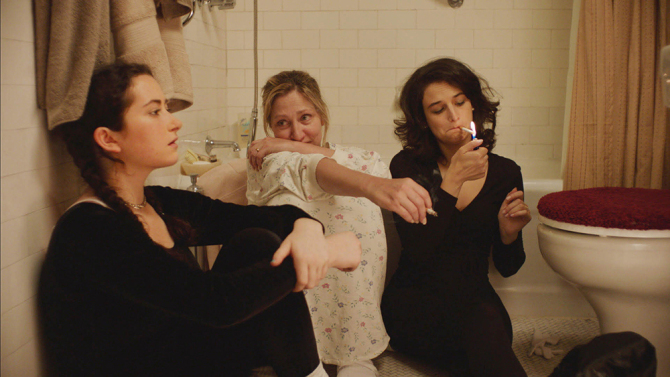
Jenny Slate is one of film’s most unique talents. With her slight frame, pert features, and scratchy-squeaky voice, she’s in ever present danger of being cutesy—remember, this is the woman who gave us Marcel the Shell With Shoes On, after all—but she also has a keen intelligence, an explosiveness to her laugh, and a sexual frankness that gives her an edge. In the wrong hands—say, the bland Chris Evans vehicle Gifted, or even in her brief role on the TV series Girls—she’s just another cutie-pie hipster. But given the right material—Obvious Child and now Landline—her full complement of gifts are on display.
Of course, Obvious Child and Landline have something in common—they are both co-written and directed by rising star Gillian Robespierre, who understands Slate the way the great Nicole Holefcener (Please Give) understands her own quirky and brilliant muse, Catherine Keener.
Obvious Child was a star-vehicle for Slate, while Landline is more of an ensemble piece (with Slate front and center) and it demonstrates that Robespierre is generous with all her actors, each of whom gets lots of space to shine (it helps, of course, that the cast is stellar).
The setting is Manhattan in the 90s—think mixed tapes, CD-ROMs, nose piercings, and, yes, landlines—and Slate’s Dana is living with her fiancé, Ben (Jay Duplass). They have a comfortable, simpatico relationship, although it’s not quite crackling with sexual energy—and Dana worries that she’s settling. Meanwhile, Dana’s rebellious high-school-aged sister Ali (Abby Quinn) discovers that their father, failed playwright Alan (John Turturro) has been cheating on their highly competent civil servant mother, Pat (Edie Falco). At the same time, Dana is begins a furtive affair with an old college friend, Nate (Finn Witrock), and moves back in with her family.
Certain elements of Landline are clichéd—we’ve seen this kind of domestic drama of infidelity before; not to mention the film’s “they’re imperfect. . .and that’s why we love them!” take on family—but the joy is in its specificity, its pitch-perfect sense of this family in this place. Details ring true, like the Benihana where Alan has been taking his daughters forever (as girls, they were amused by his inability to catch a flying shrimp in his mouth; now they just roll their eyes at him) or the believably chintzy and lived-in summer house where Dana and Ali both retreat to get away from their parents. If anything, at times the details feels too specific: I’m not sure, for example, why the restless Ali needed to experiment with heroin—that’s a pretty big drug to drop into the middle of a screenplay with virtually no consequences.
But Landline is warm and observant, gently funny and moving. And sometimes, as the film argues, cozy and familiar is exactly what you need.
Landline opens Friday, August 4 at the Charles Theatre
